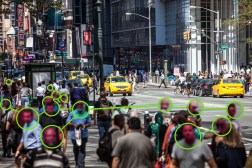Industry craves deeper trust from intel agencies for AI success

When working with the private sector, simply providing predictable data for artificial intelligence and machine learning models won’t cut it anymore.
To fully develop the use of these technologies, the intelligence community needs to work with the private sector more closely, Justin Fier, director of cyber intelligence and analytics at Darktrace, said during a panel at the AI World Government conference Monday.
“You can’t test [machine learning]-based solutions the way you tested old software,” Fier said. “I need real user data.”
Fier cited the difficulty in having that level of trust between secretive government agencies and the private sector but added that the two sectors need to work closely together to achieve common goals.
The technology needs to come from the private sector first, Teresa Smetzer, chief executive officers of Smetzer Associates and former director of Digital Futures at the CIA, said in a separate panel Monday.
“We have made that mistake many times over,” she said about not looking to private sector innovation.
Disinformation and misinformation campaigns are the exact type of threats AI can help create and also combat. Campaigns like Russia’s in the 2016 U.S. presidential election amount to “a war of cognition,” said Brett Horvath, president of Guardians.ai.
The fear for the intelligence community is that no one part of the government is big enough, fast enough and has the money to fully develop and implement artificial intelligence to combat threats like disinformation, Smetzer said. Collaboration with private companies is crucial.
But a change must come from within as well. The IC and defense industry has long used the same acquisition models for purchasing machinery, a model that won’t work for emerging technology. There needs to be an increased level of technical acumen inside agencies working with the technologies, said Todd Myers, automation lead at the National Geospatial-Intelligence Agency.
“There will always be this rubber band pulling you back,” Myers said about the outdated acquisition process. “There has got to be a complete paradigm shift.”






